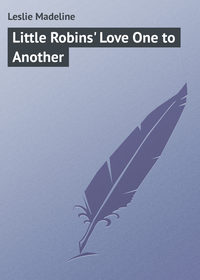Kitobni o'qish: «Little Robins' Love One to Another»
CHAPTER I.
JACK ROBIN'S OFFENCE
It was a lovely May morning. The air was full of sweet fragrance from the orchards of blossoming trees. All nature seemed alive with melody. The singing of birds, the humming of insects, the cooing of doves about their cotes, the responsive crowing of the cocks in the farm yards, the lowing of the cows for their calves, – even the gurgling of the ambitious little brook running along over stones and pebbles at its utmost speed, sparkling and foaming in the ecstasy of its delight, – all hail with exultation the approaching summer.
But let us turn from this universal rejoicing to our friends under the old elm tree. Mrs. Symmes we see standing within the shed churning butter. Fred is before the door, with a pail of dough in his hand, calling "chick, chick, chick." Annie is following grandpa to the barn with a pan of warm milk for Whiteface, while the good farmer is driving his oxen to the field.
The barn yard gate has been accidentally left open, and the cosset, hearing Annie's voice, bounds forward to meet her, and puts his fore feet on her dress, nestling his head under her arm.
"O grandpa!" exclaimed the child, "do please take the pan; Whiteface is making me spill it all over."
"Set it down on the ground, dear, and let her drink it," said grandpa.
"I have a good mind to let her run round with me, as I did yesterday," continued Annie.
As grandpa smiled approval, the two were presently engaged in a merry chase from house to barn, round the trunk of the old tree and back to their starting spot again.
"Now," cried the little girl when she could recover her breath, "it's time to feed my Robin family. O, they are all here!" she added, as she opened the front door.
Jack, without waiting for further invitation, hopped into the entry, and then into the room. The table was set for the family, and he made bold to fly upon it, and walk round among the dishes. He looked so funny as he hopped a step or two, and then, standing on one leg, turned his head archly, as if to say, "I hope I don't intrude," that Annie laughed till she cried.
"O, where is Fred? I do wish Fred were here to see the robin!" she exclaimed, as her mother entered with a dish of smoking hot potatoes.
"Tut, tut, tut," cried Mrs. Symmes, "you are getting rather too bold;" and she shook her apron to scare the robin away. "No, no, birdie, you must be content with eating the crumbs from the floor."
In the mean time, Mr. and Mrs. Robin were talking to Jack in a very excited tone, trying to convince him of the impropriety of his conduct.
"No," said Mrs. Robin, as Katy hopped closer to her brother, and cast a pleading glance at her parents; – "No, I do not accuse you of intending to do wrong, but you have never seen your father hop on a table, or take liberties of that kind."
Jack did not try to excuse himself, and as Annie called them to the door, and fed them from her hand, the parents hoped she was not much offended.
Mr. Robin noticed that when Jack was reproved by his mother, Dick was very much pleased, while Molly and Katy appeared greatly distressed. "O," said he to himself, "why will not this unruly bird imitate the lovely example of his sisters!"
When they returned to the tree, and were sitting on their favorite bough near the nest, Dick exclaimed, "I was glad, for once, to see that some one was in fault beside myself. If I had been guilty of such a breach of propriety, I should have been severely chastised, if not disinherited; but bad as you have always thought me, I have never been guilty of any thing like that."
"I am sorry to hear you talk so, my son," said Mrs. Robin, eyeing him with a sad glance. "Jack was rather too familiar, and perhaps took undue advantage of the kindness of our friends; but that was all. There was no unfriendly feeling, no selfishness, no disregard of others' wishes in his conduct; neither was there direct disobedience to his parents' commands, such as has often pained us in your case. We must judge the motive, my son, before we condemn."
"I knew it would be just so," answered Dick, in a sulky tone. "Every thing that Jack does is right, and every thing I do is wrong; and that is a specimen of the justice of this family."
